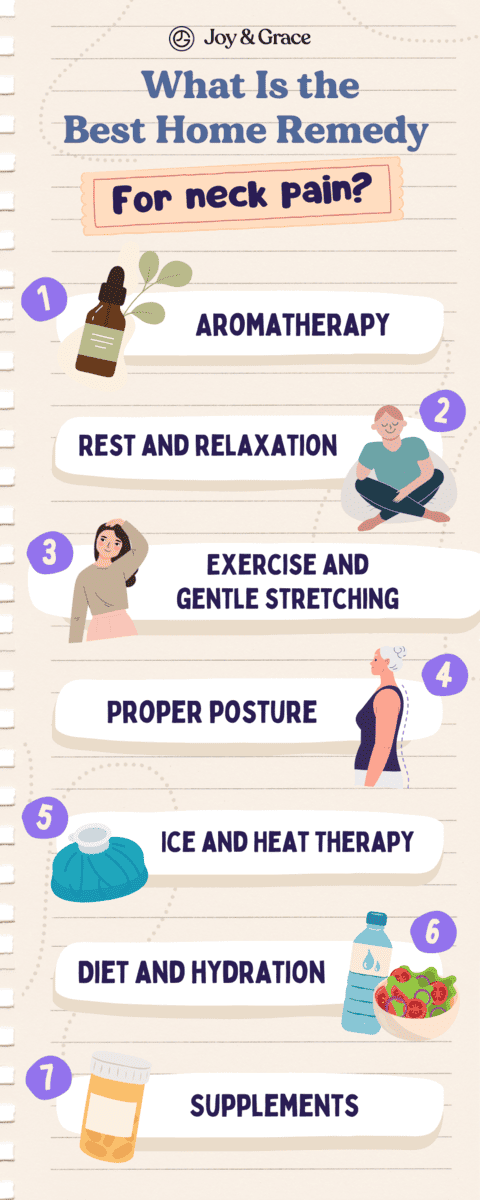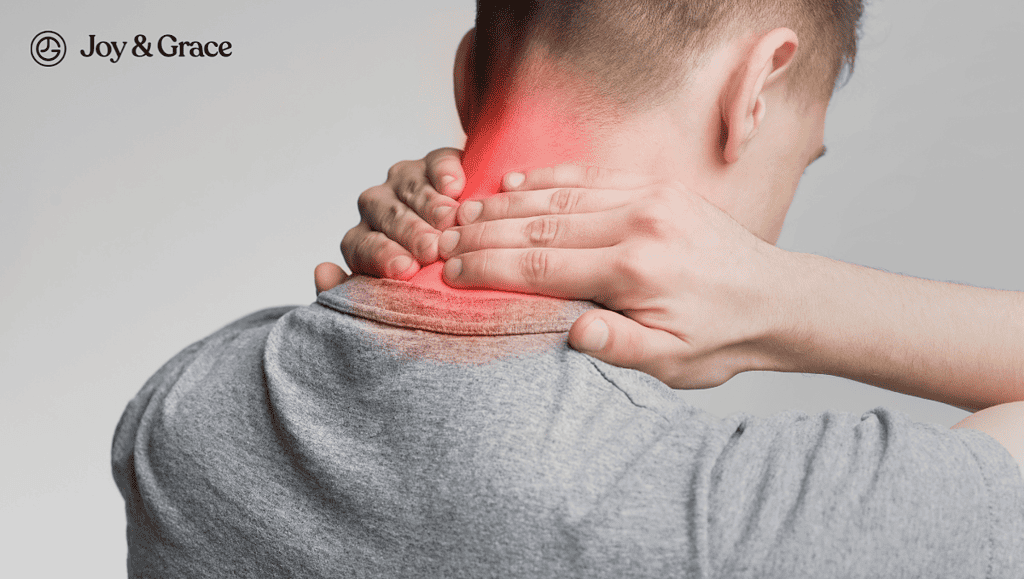Up to 50% of people deal with neck pain every year. And if you’re part of that number, you might’ve been searching far and wide for ways to relieve the pain at home.
Well, you're in good company, as we've gathered easy home remedies to help you say goodbye to neck pain quickly.
What Is the Best Home Remedy for Neck Pain?

Neck pain can require a comprehensive approach that tackles multiple factors contributing to the pain. So, it’s important to note that there may not be an exact “best” home remedy. However, there are still some straightforward approaches that prove helpful for most individuals.
If you’re dealing with recurrent neck pain, these effective home remedies might come in handy:
- Rest and relaxation
Rest and relaxation are crucial for alleviating neck pain. When your neck muscles are strained or tense, taking time off can greatly reduce the pain. Trying to reduce stress is another good idea. We know it’s not as easy as it sounds, but stress commonly contributes to neck pain. Try to practice deep breathing and engage in your favorite activities once in a while.
- Exercise and gentle stretching
While it may seem contradictory, staying active is one of the most effective ways to eliminate neck pain.
Simple neck stretches and exercises can help strengthen your neck and enhance flexibility. This can reduce the reoccurrence of the pain. We have a comprehensive list of neck exercises and stretches here.
- Proper posture
Always observe proper posture. Poor posture, like slouching, can worsen neck pain. An ergonomic setup, whether at the office or at home, can help greatly.
- Ice and Heat Therapy
Heat therapy is another effective home remedy for neck pain and stiffness. A warm bath, heating pad, or hot towel can stimulate blood flow and help relax stiff neck muscles. This may be more helpful for chronic neck pain and stiffness. Apply a heat pad or warm towel to the affected area for 15-20 minutes.
On the other hand, cold therapy might be best suited for fresh injuries or newly inflamed areas. Use a cold pack (or ice pack) wrapped in a cloth and apply it to the neck for 10–15 minutes.

- Diet and hydration
Proper nutrition supports overall health and healing. In addition to that, staying adequately hydrated also helps relieve and prevent neck pain. We’ll talk more about these aspects later.
- Supplements
Supplements may help with neck pain by targeting inflammation and promoting overall muscle and joint health.
For instance, omega-3 fatty acids in fish oil supplements possess anti-inflammatory properties. These fatty acids can help reduce any inflammation in your neck.
Additionally, supplements like magnesium and calcium help relax muscles and support bone health, potentially easing muscle pain and reducing tension.
However, consulting a healthcare professional before starting any supplement is essential. Supplements don’t serve as replacements for appropriate medical care.
It’s also important to note that individual responses to supplements can vary, and the expense associated with regular supplementation should also be considered.
- Aromatherapy
Aromatherapy means using good-smelling oils to help you feel better.
Essential oils like lavender and peppermint, in particular, have shown potential for reducing pain and enhancing relaxation. According to a review, acupressure (a type of massage) using lavender oil can be an effective complementary treatment for chronic neck pain.
In another study, a cream containing four essential oils helped improve pain tolerance in the trapezius muscle. The four essential oils used were:- Lavender,
- Peppermint,
- Marjoram,
- Black pepper.
Still, it's important to note that individual responses to these remedies may vary.
Although there's no one-size-fits-all remedy, combining these measures can help improve neck pain.
It’s important to note that nothing can replace a good ‘ole visit to the doctor. While these home remedies can give you a head start on easing neck pain, severe or persistent neck pain requires a professional opinion.
Is Heat Better Than Ice For Neck Pain?
The truth is that both heat and ice can work equally well for neck pain. The choice simply depends on the cause of the pain and the stage of the injury.
In general, heat therapy is more suitable for chronic pain or muscle stiffness. Heat helps increase blood flow and relax any tense muscles. It can be effective in soothing sore muscles and reducing muscle spasms. Just make sure to avoid heat during an acute neck injury, as it can worsen the inflammation.
On the other hand, ice is recommended during the acute phase of an injury or when there is inflammation present. The cool ice helps reduce swelling by constricting your blood vessels and also numbing the affected area.
What Is the Fastest Way to Relieve Neck Pain at Home?

Fast or immediate neck pain relief can mean different things, depending on the cause. For instance, the methods mentioned above can quickly relieve neck pain due to muscle tension.
If, however, the cause is a herniated disk, it's important to note that these methods may not provide a long-term solution. In these situations, medications prescribed by a doctor can be more effective regarding pain relief.
If you're looking for fast relief from neck pain, regardless of its cause, consider these methods:
- OTC painkillers
Your doctor may recommend the following over-the-counter medications for neck pain:
- Nonsteroidal Anti-Inflammatory Drugs (NSAIDs)
Drugs like ibuprofen can help reduce inflammation and relieve pain. They can be effective for neck pain caused by inflammation, such as arthritis or muscle strains. - Acetaminophen (Tylenol)
Acetaminophen is a pain reliever and fever reducer. It can help reduce pain, but it doesn't have the anti-inflammatory properties that NSAIDs offer.
- Nonsteroidal Anti-Inflammatory Drugs (NSAIDs)
- OTC topical pain relievers
There are creams, gels, and patches available that contain substances that can help ease pain. These can be applied directly to the skin over the painful area and are absorbed through the skin to provide relief. Look for the following ingredients:- Capsaicin,
- Camphor,
- Menthol,
- Peppermint.
We have a more comprehensive article for fast neck pain relief here.
How Should I Sleep With Neck Pain?

If you didn’t know, the way you sleep really matters if you have neck pain. A certain sleeping position may actually worsen or contribute to the pain: sleeping on your stomach.
Instead, try sleeping on your back or your side. These positions are better for neck pain. If you're on your back, grab a pillow that supports the natural curve of your neck. Those fancy contoured pillows work wonders!
If you don’t have a cervical pillow, you can try tucking a small rolled-up towel under your neck for extra support. If you're a side sleeper, get a pillow that fills the space between your neck and the mattress.
Another bonus tip is to use a body pillow to hug your knees and keep your spine aligned in a neutral position.
How Do I Treat Neck Nerve Pain at Home?
Dealing with neck nerve pain can be quite a challenge. While all the methods mentioned can help relieve nerve pain, they only manage the symptoms, not the cause. Dealing with nerve pain alone may be tempting, but we recommend consulting a healthcare professional. They can provide the appropriate treatment for neck pain based on your specific condition.
What Foods Get Rid of Neck Pain?
As mentioned, eating a balanced diet rich in vitamins and nutrients helps you feel better overall and boosts your body's ability to heal.
So, if you’re suffering from neck pain, these tasty delights might help:
- Fish
Fish are rich in omega-3 fatty acids, and as we mentioned earlier, these fatty acids can help reduce inflammation and relieve pain.
According to a study, omega-3 fatty acids may have similar pain-relieving effects as ibuprofen in people with arthritic neck or back pain. They may also help reduce pain due to nerve problems.
Apart from their pain-relieving properties, incorporating these fatty acids into your diet can also enhance heart health and support brain function.
High levels of omega-3 fatty acids are particularly found in salmon, mackerel, and tuna.
- Nuts and Seeds
If you’re looking for a vegan-friendly source of omega-3 fatty acids, you can try adding nuts and seeds to your diet. Consider adding the following to your favorite smoothie bowl or meal:
-
- Almonds,
- Walnuts,
- Flaxseeds,
- Chiaseeds.
It's important to note that many people may have allergies to certain types of nuts. Therefore, before adding them to your meals, be mindful of potential allergies.

- Fruits
Certain fruits, like oranges, are packed with vitamin C. This vitamin helps produce collagen, a key ingredient for maintaining healthy bones and joints, possibly helping to reduce neck pain. According to a study, low levels of vitamin C were linked with higher levels of neck, lower back, and knee pain.
Fruits are also a rich source of other vitamins and minerals that help maintain overall health.
- Leafy Greens
Like fruits, leafy greens are full of vitamins and minerals, like calcium and magnesium, that contribute to bone, muscle, and joint health. Consider adding the following to your weekly salad bowl:
-
- Spinach,
- Kale,
- Collard greens.
It’s important to consult with your healthcare provider before changing your diet. People respond differently to diet changes. While some may feel better with certain diet changes, these methods don't work for everyone. Many factors, like medical conditions and food allergies, can affect their effectiveness.
What Drink Helps With Neck Pain?

You might be surprised to learn that something as basic as water can help you relieve neck pain at home. Drinking enough water is important to keep your bones and muscles working well.
For example, hydration levels play a role in intervertebral disc degeneration. Intervertebral discs are like cushions between the bones in our spine (vertebrae). They help our back and neck move smoothly. These discs contain water, and having the right amount of water (hydration) is crucial. If these discs lose water, they can become stiff and less flexible. When they're stiff, it can lead to neck pain. So, keeping these discs hydrated is important to prevent neck stiffness and pain.
Hydration can also affect your performance in sports and exercise. However, drinking pure water may not be helpful in these cases. In fact, some authors suggest it may contribute to the problem. According to a study, drinking water right after dehydration may make you more prone to muscle cramps. This is because it creates an electrolyte imbalance.
Electrolytes are like tiny helpers in our body that make sure our muscles and nerves do their jobs correctly. When we play a lot or sweat a ton, we lose these helpers. If we lose too many, our muscles can get really tired and cramp up. Just drinking water without putting some of those helpers back can make things even worse.
According to the same study, adding electrolytes can decrease the risk of muscle cramps. This is where sports drinks can help. These drinks not only rehydrate you, but they also add back the lost electrolytes. But take note: not all sports drinks can help. Some sports drinks don’t have the right balance of fluids and electrolytes, which may worsen the problem.
Takeaway
Neck pain is a common issue that can be disruptive and frustrating. Luckily, several home remedies can offer effective relief. These can be simple lifestyle changes, such as:
- Rest and relaxation,
- Regular exercise,
- Diet and hydration
You may also try:
- Supplements,
- Aromatherapy,
- Topical pain rubs,
- OTC painkillers
While these home remedies can be effective, they may not help in severe cases. Consider consulting a healthcare professional if you have persistent, severe pain.
Remember, these home remedies for neck pain are not a replacement for professional treatment. The intensity and cause of your neck pain will dictate the most effective remedy.















